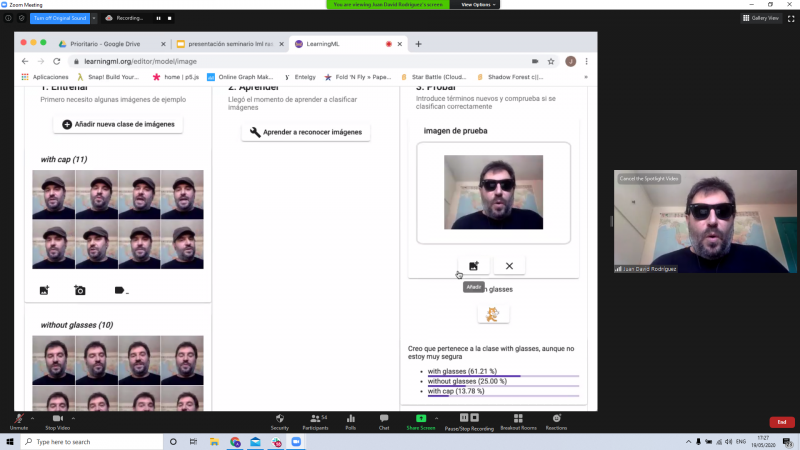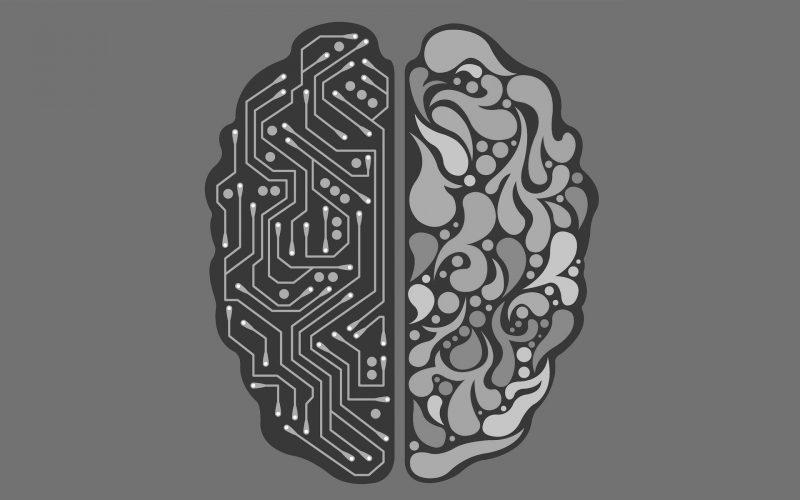“In the near future, perhaps sooner than we think, virtually everyone will need a basic understanding of the technologies that underpin machine learning and artificial intelligence.” — from the 2018 Informatics Europe & EUACM report about machine learning
As the quote above highlights, AI and machine learning (ML) are increasingly affecting society and will continue to change the landscape of work and leisure — with a huge impact on young people in the early stages of their education.
But how are we preparing our young people for this future? What skills do they need, and how do we teach them these skills? This was the topic of last week’s online research seminar at the Raspberry Pi Foundation, with our guest speaker Juan David Rodríguez Garcia. Juan’s doctoral studies around AI in school complement his work at the Ministry of Education and Vocational Training in Spain.

Juan’s LearningML tool for young people
Juan started his presentation by sharing numerous current examples of AI and machine learning, which young people can easily relate to and be excited to engage with, and which will bring up ethical questions that we need to be discussing with them.
Of course, it’s not enough for learners to be aware of AI applications. While machine learning is a complex field of study, we need to consider what aspects of it we can make accessible to young people to enable them to learn about the concepts, practices, and skills underlying it. During his talk Juan demonstrated a tool called LearningML, which he has developed as a practical introduction to AI for young people.

Juan demonstrates image recognition with his LearningML tool
LearningML takes inspiration from some of the other in-development tools around machine learning for children, such as Machine Learning for Kids, and it is available in one integrated platform. Juan gave an enticing demo of the tool, showing how to use visual image data (lots of pictures of Juan with hats, glasses on, etc.) to train and test a model. He then demonstrated how to use Scratch programming to also test the model and apply it to new data. The seminar audience was very positive about the LearningML, and of course we’d like it translated into English!
Juan’s talk generated many questions from the audience, from technical questions to the key question of the way we use the tool to introduce children to bias in AI. Seminar participants also highlighted opportunities to bring machine learning to other school subjects such as science.
AI in schools — what and how to teach
Machine learning demonstrates that computers can learn from data. This is just one of the five big ideas in AI that the AI4K12 group has identified for teaching AI in school in order to frame this broad domain:
- Perception: Computers perceive the world using sensors
- Representation & reasoning: Agents maintain models/representations of the world and use them for reasoning
- Learning: Computers can learn from data
- Natural interaction: Making agents interact comfortably with humans is a substantial challenge for AI developers
- Societal impact: AI applications can impact society in both positive and negative ways
One general concern I have is that in our teaching of computing in school (if we touch on AI at all), we may only focus on the fifth of the ‘big AI ideas’: the implications of AI for society. Being able to understand the ethical, economic, and societal implications of AI as this technology advances is indeed crucial. However, the principles and skills underpinning AI are also important, and how we introduce these at an age-appropriate level remains a significant question.

There are some great resources for developing a general understanding of AI principles, including unplugged activities from Computer Science For Fun. Yet there’s a large gap between understanding what AI is and has the potential to do, and actually developing the highly mathematical skills to program models. It’s not an easy issue to solve, but Juan’s tool goes a little way towards this. At the Raspberry Pi Foundation, we’re also developing resources to bridge this educational gap, including new online projects building on our existing machine learning projects, and an online course. Watch this space!
AI in the school curriculum and workforce
All in all, we seem to be a long way off introducing AI into the school curriculum. Looking around the world, in the USA, Hong Kong, and Australia there have been moves to introduce AI into K-12 education through pilot initiatives, and hopefully more will follow. In England, with a computing curriculum that was written in 2013, there is no requirement to teach any AI or machine learning, or even to focus much on data.
Let’s hope England doesn’t get left too far behind, as there is a massive AI skills shortage, with millions of workers needing to be retrained in the next few years. Moreover, a recent House of Lords report outlines that introducing all young people to this area of computing also has the potential to improve diversity in the workforce — something we should all be striving towards.
We look forward to hearing more from Juan and his colleagues as this important work continues.
Next up in our seminar series
If you missed the seminar, you can find Juan’s presentation slides and a recording of his talk on our seminars page.
In our next seminar on Tuesday 2 June at 17:00–18:00 BST / 12:00–13:00 EDT / 9:00–10:00 PDT / 18:00–19:00 CEST, we’ll welcome Dame Celia Hoyles, Professor of Mathematics Education at University College London. Celia will be sharing insights from her research into programming and mathematics. To join the seminar, simply sign up with your name and email address and we’ll email the link and instructions. If you attended Juan’s seminar, the link remains the same.
Website: LINK

